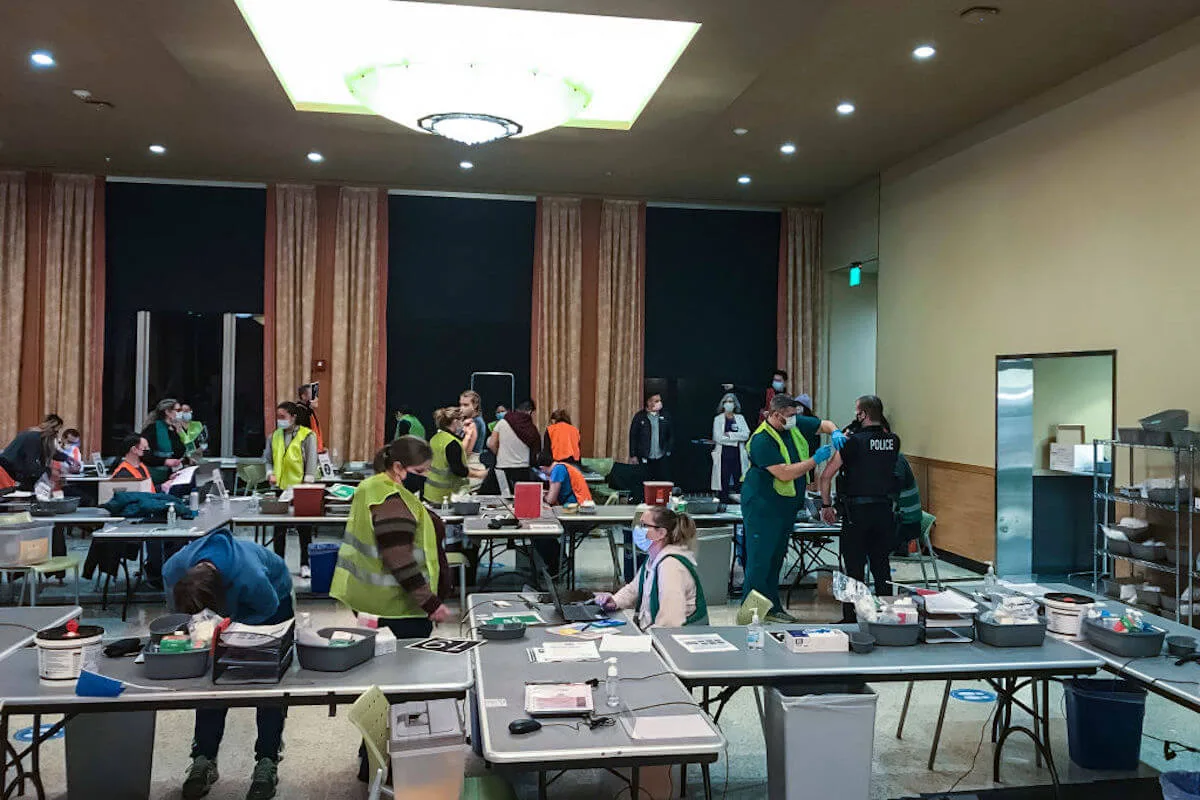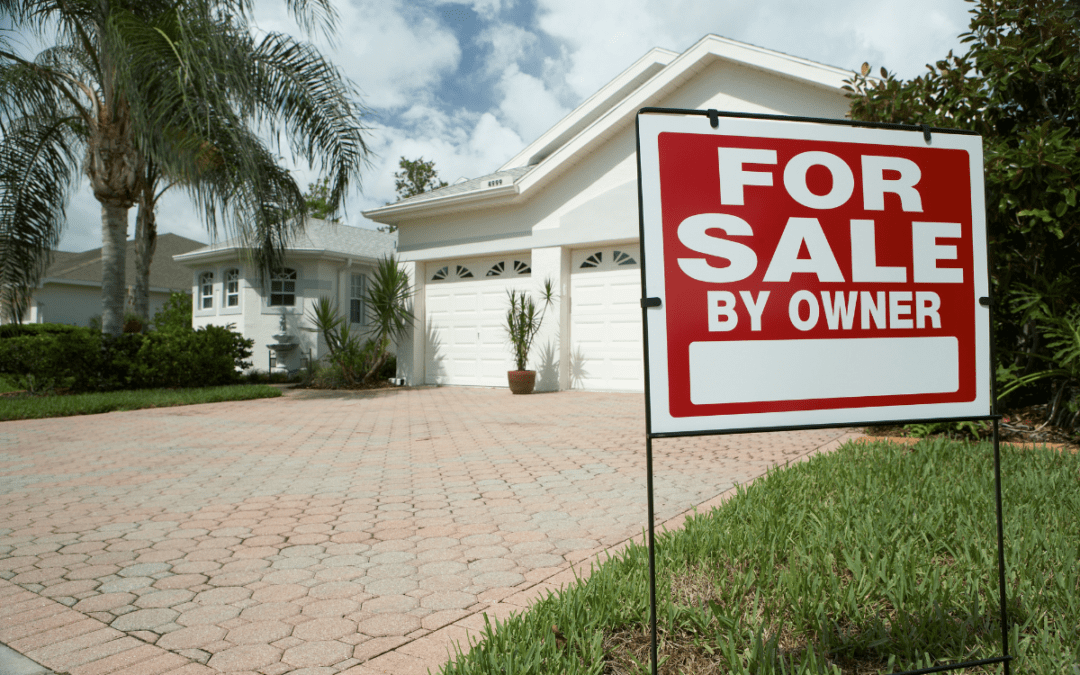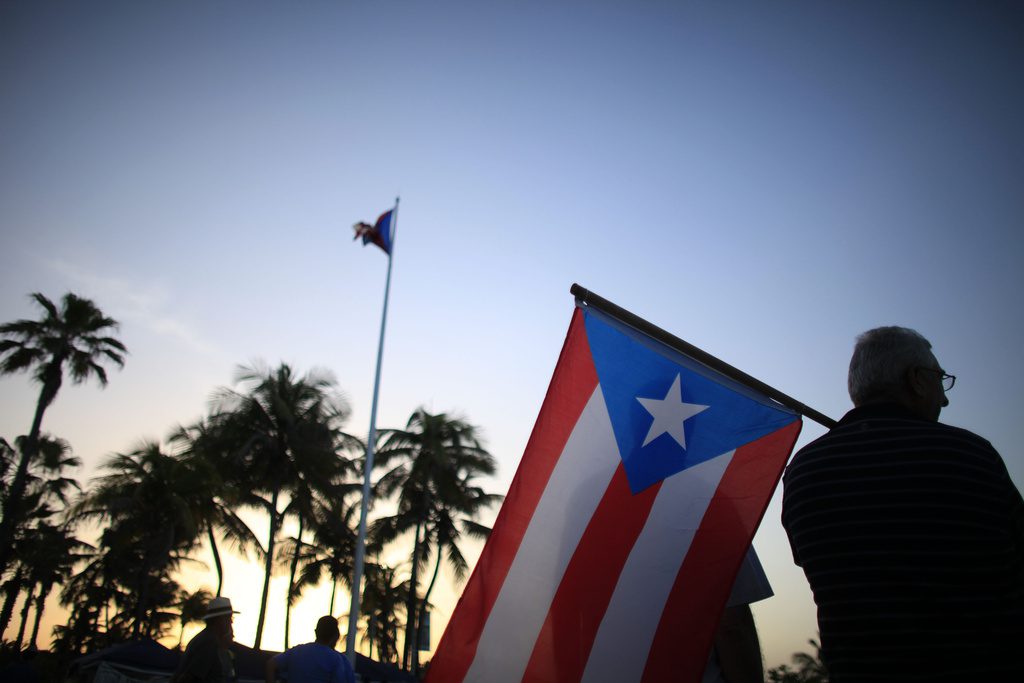
SEATTLE, WA - Healthcare workers distribute vaccines late into the night at Seattle University after a freezer failure at a nearby hospital. The impromptu overnight event was organized to ensure COVID-19 vaccine doses from the hospital did not go to waste. More 24-hour vaccination centers would make efficient uses of vaccines, as vials with unused doses cannot be refrozen and must be tossed. (Photo by David Ryder/Getty Images)
There are only a handful of 24-hour vaccine centers in two states, and they’ve already exponentially increased the number of daily doses being administered. As experts predict another COVID surge, more are needed now.
Under the Trump administration, cities and states across the country were tasked with distributing the COVID-19 vaccine throughout their communities, resulting in a hodgepodge of different laws, requirements, and distribution methods.
With no federal standard in place, states are scrambling to get people vaccinated quickly. One proposal gaining traction is creating vaccine distribution centers that are open 24 hours a day, seven days a week. Places where it’s been tried thus far have seen positive results. As yet, few regions have made the option available. New York City and Phoenix are the first major cities to move forward with such a plan.
When vaccine distribution began in New York City, the first major hotspot of the virus, daily vaccinations did not top 10,000 and were only distributed during regular business hours.
Since those early weeks, the city has opened five 24/7 vaccine distribution hubs with three more planned. Authorities say each center has the capacity to vaccinate 2,000 people a day. Health leaders also broadened vaccine eligibility beyond healthcare professionals, to include essential workers. The results were instantaneous. On Jan. 11, when the first 24/7 centers opened, daily vaccinations doubled according to data from the New York City Department of Health.
The race to streamline vaccine distribution has fresh motivation. Recently, several new strains of COVID-19 that have proven to be significantly more transmissible have been identified in states including New York, California, and Colorado—making a dire situation that much more time sensitive.
“What [the push for 24/7 vaccination centers] represents is a real recognition that we need to vaccinate as quickly as we can—recognizing we want to do it in the right way,” Dr. Buddy Creech, director of the Vaccine Research Program at Vanderbilt University, told COURIER.
Vaccination centers that are open around the clock do not just expedite the process; they also offer the opportunity to maximize available doses, as both Pfizer and Moderna’s vaccines have a limited shelf life once thawed.
If someone misses their appointment, explained Dr. Bruce Lee, Professor of Health Policy and Management at CUNY Graduate School of Public Health, and those thawed doses are nearing their expiration date, they may have to be thrown out when the distribution site closes. “The problem with open vial wastage is that if you have a 10-dose vial and only two people show up, you have to toss the [remaining] eight doses,” Dr. Lee told COURIER.
Dr. Ashish Jha, dean of the Brown University School of Public Health, told NBC News that “hundreds, if not thousands of doses are getting tossed across the country every day.” In North Carolina, for example, public health officials were forced to discard nearly 1,300 doses, which represents about 0.1% of the total supply the state has received.
If centers can “get more people to show up, you won’t have to toss [unused] doses,” said Dr. Lee. “So a 24/7 vaccine distribution center will help in that regard.”
Recently discovered strains and shortages on the supply chain reflect the importance of making every vial count. “It is very important to recognize that every dose matters and when we have such a limited resource such as these vaccines right now, the last thing we want to do is for any of those doses to be left in the vial or the syringe and not make it into our citizens’ arms,” said Dr. Creech.
In Arizona, which is currently experiencing a surge, state officials partnered with the Arizona Cardinals to turn State Farm Stadium into a 24/7 vaccine distribution center. According to the local ABC affiliate, within three days of opening the center inoculated 63,000 people.
Taking matters a step further, to ensure vaccines are not wasted, the state has instituted a plan to allow caretakers of vaccine recipients to also get vaccinated if there are no-show appointments.
The 24/7 time frame also helps reach essential workers who work off hours. “When the vaccine shifts to working age people it will be ideal. There are some people you will never be able to reach using 9-5 approaches,” Dr. Andrew Noymer, associate professor of Population Health and Disease Prevention at the University of California – Irvine, told COURIER.
Other cities are considering similar options. Los Angeles has opened a mass vaccination center similar to the Arizona Cardinals, at Dodgers Stadium.
Public health experts believe that as more centers open, more vaccines will be distributed to more groups of people.
“When this moves to the next level of vaccinations, to the younger populations, 24/7 [centers] will be welcomed,” Dr. Don Taylor, former healthcare executive and professor of Organizations, Strategy and International Management at Naveen Jindal School of Management at the University of Texas-Dallas told COURIER.
So far, only New York City and the greater Phoenix area have established 24/7 centers. Dr. Taylor hopes to see every region have some level of vaccine access available 24/7.
“If I were governor anywhere in this nation, I would be creating a 24/7 portal to do this in every city. In a small community maybe it’s nothing more than an urgent care center but they should be identified and part of the statewide plan,” Dr. Taylor said.
Earlier this month, he presented suggestions to leadership at UT Southwestern Medical Center in Dallas. In his talking points, he pointed to the success of Israel’s 24/7 vaccination plan. Israel has already vaccinated more than 30% of their population, and are on track to vaccinate all 9 million residents by the end of March.
Politics

Housing market cools along Florida’s Gulf Coast
The uptick in the construction of new housing followed the influx of newcomers to Florida during the pandemic, but that boom is now tapering off....



Get ready, Orlando: Westcourt District promises thrilling entertainment, more
The district will be built in an 8.5-acre complex next to the Kia Center at West Church Street and South Hughey Avenue. Orlando residents and...
Local News



Housing market cools along Florida’s Gulf Coast
The uptick in the construction of new housing followed the influx of newcomers to Florida during the pandemic, but that boom is now tapering off....



Get ready, Orlando: Westcourt District promises thrilling entertainment, more
The district will be built in an 8.5-acre complex next to the Kia Center at West Church Street and South Hughey Avenue. Orlando residents and...



